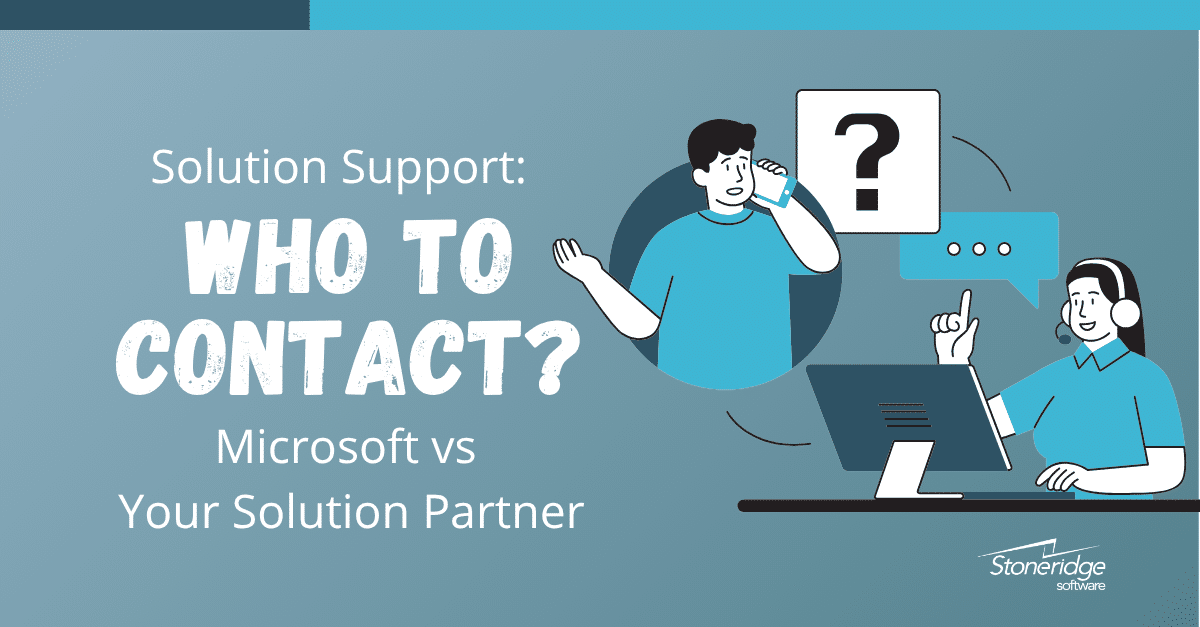Solution Support: When to Talk to Your Partner vs When to Reach out to Microsoft
If your business uses Microsoft technologies, you’ve probably wondered when to seek support from your partner and when to contact Microsoft directly.
The truth is, there are a lot of factors that go into that decision:
- The complexity of your issue: Are you looking for long-term transformation or short-term troubleshooting?
- The type of support you need: Do you want strategic, ongoing guidance on how to best optimize your solutions, or are you looking for a quick technical fix?
- The strength of your partner relationship: Does your partner have the proper resources to help you deal with your issue, or do you need to go directly to the source?
The answer to these questions is multifaceted and may require you to conduct some research to determine the best path forward. In this blog, we hope to save you that time by outlining when you should go to your partner vs when you might want to go to Microsoft.
Additionally, we will highlight the importance of choosing a partner with a well-rounded team of support experts who can provide quick and proactive support without you having to go directly to Microsoft.
When to Go to Your Partner Organization
Microsoft partner organizations are often your first line of defense. Especially if they have helped implement, customize, and optimize your Microsoft solutions. Here are some common support scenarios when going to your partner makes the most sense:
Strategic Relationships with Microsoft
While there are moments when you can go directly to Microsoft for support, working with a great partner will often allow you to bypass what can be lengthy wait times for a response from Microsoft. You may come across a support request that your partner might not be able to address, but you should still heavily consider using them.
Microsoft partners like Stoneridge are often given priority when they submit a request to Microsoft, as opposed to end users or administrators doing so. It’s always a good idea to talk to your partner before submitting a support request directly to Microsoft to see how they can assist you in getting the support you need.
Customizations and Configuration Support
It’s likely that your partner implemented and customized your solutions for you, meaning their team has a unique and thorough understanding of your business. Going through your partner is best for support requests such as:
- Issues related to custom apps, Power Platform solutions, customized Dynamics 365 workflows, and cloud security.
- Help with integrations between Microsoft tools and third-party systems that help extend your solutions.
- Support for tailored business processes built on top of the Microsoft stack.
Advisory and Strategic Guidance
In the process of implementing your solutions, your partner gains a unique understanding of your business that a larger organization like Microsoft often can’t match. This means your partner will be better if:
- You need consulting on how to optimize usage.
- You’re trying to boost user adoption of new technologies and tools.
- You want to align your solutions with your key performance indicators and business goals.
- You’re planning a new rollout, migration, or upgrade and want expert input.
Managed Services and Additional Business Tools
Certain aspects of your Microsoft technology require ongoing and proactive support that is out of the scope of what someone working directly for Microsoft can give you. This includes:
- Ongoing managed services or cyber protection with defined SLAs
- Proactive monitoring, performance tuning, routine system health checks
- Continuous support plans
- Assistance with other business tools such as change management, data insights, training, and more.
Localized Support
Sometimes it’s nice to work with people who understand the local aspects of your business and can even potentially offer on-site training and support. Finding a Microsoft partner in your area can connect you with support teams that understand your unique geographical challenges and establish stronger personal connections with your team.
Use Cases for Going to a Microsoft Partner
These are typically business-specific, customized, or consultative scenarios:
1. Custom Power App Isn’t Working
- You’ve built a Power App with help from your partner to manage internal workflows.
- After a recent update, the app crashes or behaves unexpectedly.
- Go to your partner, since they built and configured the app and understand your business logic.
2. Dynamics 365 Custom Workflow Fails
- A custom approval process in Dynamics 365 Sales stops triggering.
- It was built using Power Automate and tailored to your org’s hierarchy.
- Your partner is best equipped to troubleshoot and fix this.
3. Azure Integration with On-Prem Systems
- You’re syncing data between Azure SQL and an on-prem ERP system.
- The integration was designed by your partner and involves custom connectors.
- Go to your partner for support and optimization.
4. Strategic Planning or Licensing Advice
- You’re expanding and want to know whether to use Microsoft 365 E5 or Business Premium.
- You also want to forecast Azure costs and optimize licensing.
- Your partner can offer tailored advice and even bundle services.
When to Go Directly to Microsoft Support
Microsoft support is best suited for issues that are platform-level, technical, or subscription-related. Here’s when you’d escalate to them:
Platform Outages or Critical Failures
- You’re experiencing a service outage, data loss, or security breach.
- Severity A issues with significant business impact—Microsoft offers 24/7 support with <1 hour response time for critical cases.
Oftentimes, Microsoft will notify partners of outages, who can then relay that information to you. However, if an issue comes up that is out of your partner’s regular service hours, you can go directly to Microsoft.
Break-Fix Technical Support
- Problems with core Microsoft services like Azure infrastructure, Microsoft 365 apps, or Dynamics 365 standard features.
- You need help with billing, licensing, or subscription management.
At Stoneridge, we have experts available to help you with these situations or can help get an answer from Microsoft faster. Additionally, we offer a free licensing assessment to help you optimize license usage, adjust to frequent changes, and ensure you and your team are compliant.
Unified or ProDirect Support Plans
You’ve purchased a Microsoft Unified Support or Professional Direct plan, which includes access to Microsoft engineers and advisory services.
Public Preview or Beta Features
You’re testing new features in preview and encounter issues—Microsoft handles support for these directly. Partners can also help you identify and test features in preview before they go live, and help you determine the areas of your business that can be improved by using them.
Use Cases for Going to Microsoft Directly
These are typically platform-level, subscription-related, or critical-impact scenarios:1. Microsoft 365 Outage
1. Outlook and Teams are down across your organization.
- You’ve confirmed it’s not a local issue.
- Go to Microsoft, especially if you have a support plan—they’ll confirm service status and provide updates.
2. Azure VM Won’t Start
- A virtual machine in Azure fails to boot and throws platform errors.
- You suspect it’s a Microsoft infrastructure issue.
- Escalate to Microsoft, who can investigate backend logs and system health.
3. Billing Discrepancy or Subscription Issue
- You’re charged incorrectly for Microsoft 365 licenses or Azure usage.
- You need a refund or adjustment.
- Contact Microsoft billing support directly.
4. Security Breach or Data Loss
- You suspect unauthorized access to your Microsoft 365 tenant.
- Sensitive data may be compromised.
- Go to Microsoft Security Response Center or open a critical support ticket.
Best Practice: Use Both Strategically
Many companies adopt a hybrid approach:
- Partner for day-to-day operations, enhancements, and business alignment.
- Microsoft for deep technical issues, platform bugs, or when the partner escalates on your behalf.
Partners can also open tickets with Microsoft on your behalf using delegated admin privileges (GDAP), which keeps the process seamless.
Reach Out to Stoneridge for Holistic and Proactive Support
At the end of the day, you likely interact with your partner organization every day. Whether you are looking for a new support partner or are an existing client who wants to consolidate solution support, the team of Stoneridge support experts can help.
Contact us today to get started.
Under the terms of this license, you are authorized to share and redistribute the content across various mediums, subject to adherence to the specified conditions: you must provide proper attribution to Stoneridge as the original creator in a manner that does not imply their endorsement of your use, the material is to be utilized solely for non-commercial purposes, and alterations, modifications, or derivative works based on the original material are strictly prohibited.
Responsibility rests with the licensee to ensure that their use of the material does not violate any other rights.






